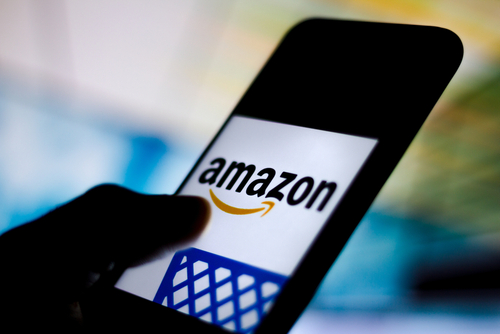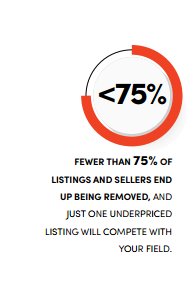Real solutions that protect you and your field.
With the massive increase in participation from everyday people in online marketplaces such as Amazon and Walmart, direct sellers are scrambling to prevent the unauthorized sale of their products online.
Indeed, the problem snowballs each year as more and more end-user customers search out direct sales companies’ products at the best price. Experts estimate that companies are facing billions of dollars in losses as marketplaces continue to profit handsomely from the enablement of gray market sales.
As the number of product listings and sellers become overwhelming, many direct sellers are spending a fortune in time and money trying to remove them.
Unauthorized sellers battle with companies for consumer dollars, and customers look for the quickest, cheapest way to get the product on their doorstep. This severely impacts a direct seller’s bottom line and—most importantly—hurts the field, as they often cannot compete with the cut-rate prices found online.
So, What Exactly Are Unauthorized Sellers?

An unauthorized seller is any third party that is not associated with your company and resells your products without your permission. This could be an individual, a former distributor, a group of sellers or even an entire business. And it is easy for them to maintain some level of anonymity, at least on the consumer-facing side of online marketplaces.
The selling often takes place on Amazon, which does not discriminate between official and unofficial sellers of products. Selling on Amazon in the US does require users to meet some basic guidelines and provide information such as Tax ID and State Tax ID but does not generally prioritize filtering out unauthorized sellers. It’s somewhat of a free-for-all, which is the perfect way for these sellers to make a payday from your product.
Why Are Unauthorized Sellers Risky to Your Field?
Part of the reason these sellers are so prolific is because the asking price for the product is often marked lower than your company’s Minimum Advertised Price (MAP), which means that the “Buy Box”—the box denoting Amazon’s highest-rated item in the search category—could go to the unauthorized listing.
Being that a high percentage of shoppers look for the “Buy Box” when deciding between two sellers, this is a big deal. They are usurping customers from you; lowering the price of your product; and deterring potential buyers from your official listing, while hurting the sales efforts of your field and thus your bottom line.
Secondly, the unauthorized sellers are the ones responsible for the quality of product they resell, which is often below quality standards put in place by your company. This can lead to negative reviews that result in a drop in customer loyalty, support and consumer trust.
In the end, you could experience damage to your online reputation and pricing integrity; hurt your overall business; and negatively impact your field’s ability to enroll and sell.
There Are So Many Solutions, But Few Solve the Problem
As a result of the shift in consumer behavior, service firms have proposed solutions. One early solution-centered legal remedy: identifying sellers; tracing product sales; and ultimately sending legal demands to discourage them from reselling the company’s products.

Another solution threatened an unauthorized seller’s bread and butter—their online store—by using Amazon’s policies against them, including intellectual property and other brand protection mechanisms, while using an escalating series of threats to press them to drop the listings.
A more recent approach that has stopped these sales centers around an attempt to “out-Amazon” Amazon itself. It is the “if-you-can’t-beat-’em-join-’em” approach: build an official corporate store; advertise it heavily; and get the official site ranked on Amazon so you capture most of the sales.
However, this tactic competes with the field. Every sale that happens on Amazon is one that is not happening through distributors.
The whole point of the direct sales model is to build sales volume through a distributed workforce of independent representatives. Selling online is contrary to the model itself; it is the opposite of selling through a networked direct selling workforce.
Typically, fewer than 75 percent of listings and sellers end up being removed, and just one underpriced listing will compete with your field.
How Can a Company Stop Unauthorized Sellers?
The only way to stop the negative impact of unauthorized listings is to remove all of them. Period.
Since companies cannot trust entities such as Amazon to do so, self-advocacy is the most valuable tool. Explore solutions that are tailored with the direct selling industry in mind and have a proven track record of eliminating all unauthorized sellers.
Companies can then follow with legal avenues. However, cleaning up their unauthorized sales problems must take a proactive, multi-faceted approach.
1/ There will always be a small segment of customers who will buy on Amazon—the goal is to fulfill those sales without driving additional sales to Amazon.
2/ Remove all unauthorized sellers from the platform.
3/ Ensure all listings are at MAP or above (otherwise customers will buy at the lowest price).
4/ Be transparent with your field about your efforts to reduce unauthorized sales and push sales back to them.
5/ Engage experts with a proven track record of helping companies with these issues.
What If We Give the Money Made Online Back to the Field?
To assuage the frustration of distributors, companies whose strategy against unauthorized sellers competes with their field may elect to pay a portion of online sales to distributors through a bonus pool in their compensation plan—removing all unauthorized sellers and pushing sales back to distributors, where they belong. This will win the day with the field—showing distributors that the company did not “give in” to Amazon and instead fought to protect their businesses.
In short, direct sales companies expend substantial resources to build brand awareness and develop quality products for distributors to sell. Unauthorized sellers can destroy a company’s field success, perception of quality and even its overall reputation.

Travis WILSON heads up all business development initiatives for Momentum Factor. A finance executive in the direct sales industry since 2016, Travis brings a wealth of experience to his position at the firm. His industry expertise uniquely allows him to understand specific customer needs and provide compliance solutions.
From the October 2023 issue of Direct Selling News magazine.


